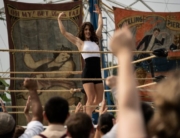
Have you ever wished you could sit down and give advice to your younger self? As imagined by Julie Taymor in the moving, timely biopic The Glorias, feminist legend Gloria Steinem gets to fulfill this fantasy with not only one version of her past but four.
Numerous scenes place middle-aged Gloria (Julianne Moore) riding on a cross-country bus along with up-and-coming writer and activist Gloria (Alicia Vikander), rebellious tween Gloria (Lulu Wilson), and bright child Gloria (Ryan Kiera Armstrong). In a metaphorically overstuffed movie, the bus is the ideal metaphor for Gloria’s journey and the activist herself—driven and powerful but always open to a promising detour on the open road. Like a busy life, the bus also carries a vivid cast of characters who get on and off at different places and times. The real Gloria Steinem even shows up aboard, looking amused at being tossed into Taymor’s kaleidoscopic version of her eventful, trailblazing story.
The beginning section features a skillfully assembled sequence of Gloria in perpetual motion: dancing as a child, traveling on a train as a young woman through color-drenched India, marching against wars and injustice. Director Taymor is known for her stylistic flourishes, but the montage highlights important Steinem character traits: curiosity, openness, empathy, and a self-protective sense of detachment. Providing more emotional development, some of the film’s most touching, insightful passages explore Steinem’s tense childhood, torn between a charismatic father addicted to get-rich-quick schemes and a sickly, thwarted mother.
If the childhood sections supply character shading, the film’s Mad Men-era interludes pony up the fun. Alicia Vikander brings skepticism and wary cool as Steinem makes her way through journalism and pushes back on sexist bosses with understated flair. Taymor clearly enjoys styling and shooting the chapter of Steinem’s going undercover as a Playboy Club bunny, a showy sequence with hard-boiled dialogue that makes the more earnest writing elsewhere sound a little flaccid. Throughout the trendy decor and plot devices, we get a sense of Steinem stretching, learning, and challenging external limits—including her own.
That sense of growth ironically loses momentum as the biopic heads deeper into more explicitly feminist territory. The tone becomes more preachy and wholesome. Taymor throws in a few Taymorian flights of fancy to lighten the load, but a movie this crammed with milestones doesn’t always need them. Dialogue does heavy expository lifting as Steinem founds Ms. magazine, becomes involved with Native American rights, and tries to duck the spotlight as the face of the U.S. women’s movement (her good looks and charm make her the defining symbol anyway).
All the while the movie cuts back to pensive scenes on that moving bus. Luckily, well-cast secondary roles bring a little glamour to the action. Bette Midler as a rollicking Bella Abzug handily steals scenes, TV veteran Lorraine Toussaint kicks major butt as activist Florence Kennedy, and Janelle Monáe memorably re-creates a famous photo of Steinem with Ms. co-founder Dorothy Pitman Hughes, fists defiantly in air.
Any restlessness induced by The Glorias is forgiven by the movie’s end, which crests in an inspiring montage of real-life footage of feminist marches and gatherings. It’s a reminder that we win some, we lose some, but the struggle to realize women’s potential continues. The film leaves an enduring impression by embodying Gloria Steinem’s own qualities of level-headed compassion, courage, and faith.






Leave A Comment